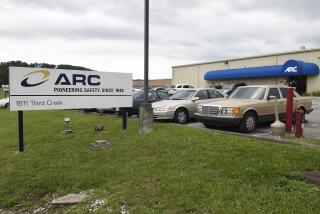Helmet Firm Seeks to Restore Reputation
- Share via
WASHINGTON — A company once accused by the Pentagon of manufacturing defective helmets for U.S. soldiers and pocketing the money it saved has launched a campaign to restore its reputation.
Gentex Corp. of Carbondale, Pa., was cleared by the Defense Department last August of allegations that a shortcut in the manufacturing process had left the helmets with soft spots on their crowns.
But company President L. Peter Frieder said that Gentex is still suffering from the blow to its reputation and the layoff of more than 200 employees that resulted from the charges.
“We were accused of something that was later proven unfounded,” Frieder said in an interview Monday. “It had a great deal of emotional effect on the organization, and it had a great economic impact.”
Sends Letters to Media
Not satisfied with the response to a Defense Department statement exonerating Gentex, Frieder said he has sent letters to more than 80 news organizations around the country in a continuing attempt to clear the company’s name.
The Pentagon had accused the firm of manufacturing defective helmets in October, 1985--about the time the Defense Department was badly shaken by widespread accusations of fiscal irresponsibility, involving such purchases as $600 toilet seats and $300 hammers. The atmosphere of scandal contributed to the tarnishing of Gentex’s name, Frieder and a Defense Department spokesman agreed.
“There may have been a little bit of overreaction at a time when the department was not getting what it was paying for,” acknowledged Gerald C. Flessate, a spokesman for the Defense Logistics Agency.
Uses Synthetic Material
At issue were 461,000 helmets made of a synthetic material called Kevlar that Gentex sold the Army and Marine Corps to replace the “steel pot” helmet that has been used for decades.
The Pentagon had charged that the company, instead of using a single sheet of Kevlar to make each helmet, used 17 pieces of the material for each helmet in violation of the department’s specifications. The Pentagon had claimed that this process resulted in the soft spots and saved the company about $42 on each helmet, which eventually sold for about $85.
After further investigation, however, the Pentagon found that the company had not violated the manufacturing specifications, and that, in fact, the helmet met all safety standards.
“They came up with a better way of doing it and thought they had approval to do it. There was no attempt to cheat the Army,” Flessate said. A statement by his agency in August said that the Pentagon will continue to do business with Gentex.
Frieder said the problem arose in part because the helmet was a new product and the Pentagon’s own manufacturing guidelines were not entirely clear.
‘Range of Interpretation’
“The reality is that there was no clear definition of how this product would be made,” Frieder said, adding that Pentagon officials “failed to realize that their specifications allowed for a broad range of interpretation.”
Throughout the controversy, Frieder noted, the Gentex helmets were never taken out of use. By the time the charges were leveled at his company, he said, the helmet had saved the lives of two soldiers shot in the helmet during the invasion of Grenada.
Although Frieder said he was pleased that the Pentagon finally had exonerated his company after 10 months, the experience left him frustrated with his inability to counter the charges and repair the damage to his firm’s name.
“The accusations of profiteering were unfounded,” he said. “It’s very difficult to address something so enormous as the Department of Defense when they come out with a grand statement.”
More to Read
Inside the business of entertainment
The Wide Shot brings you news, analysis and insights on everything from streaming wars to production — and what it all means for the future.
You may occasionally receive promotional content from the Los Angeles Times.










